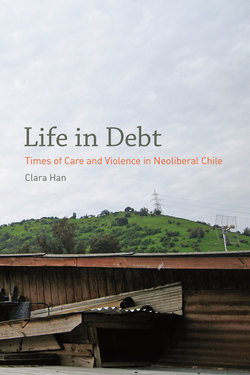Life in Debt

Реклама. ООО «ЛитРес», ИНН: 7719571260.
Оглавление
Clara Han. Life in Debt
Отрывок из книги
Advance Praise for Life in Debt
“Life in Debt will become, I predict, one of the classic ethnographies in the anthropological study of state violence, community responses, and the moral life of the global poor. Relating economic and political debt, financial and psychological depression, and caregiving by ordinary people and by social institutions, Clara Han maps our brave new world just about as illuminatingly as it has been done. A remarkable achievement.”
.....
With the golpe on September 11, 1973, history abruptly took a different course. On that day, men and women in La Pincoya saw helicopters and jets fly over the hills surrounding the población. From those same hills, they saw smoke pouring out of the presidential palace, La Moneda, where Salvador Allende had given his last radio address to the nation and then died. Because of the force of social movements, as well as its association with both socialist and communist militants, the población was a threat to the military regime. Rumors circulated that the regime had plans to bomb La Pincoya and, as people said to me, “erase it from the map.” The regime persecuted the población, subjecting it to military sniper fire. Men and boys were rounded up and contained on the soccer field while military officers interrogated them for suspected leftist leanings. Allanamientos, or household raids, were performed in order to search for contraband materials, such as pamphlets, newspapers, and books, and to take men and women into preventive detention. Men were humiliated in front of their families. Relatives and friends were disappeared, politically executed, and tortured. Those who were militants had to live clandestinely or were exiled.
Along with this state violence in the form of repression and terror, the regime advanced a policy of decentralization to fragment political organization and spatially separate the rich from the poor. According to the regime, decentralization would be the foundation of a “protected democracy.” Grassroots organizations would articulate concrete, local demands to the municipality. Thus, the state, freed of political pressure, would be able to fulfill its bureaucratic technical role. Paradoxically, Pinochet decreed “local participation,” instantiating “participation” through authoritarianism. In 1982, he decreed that municipalization would be institutionalized to “juridically organize the direct participation of the community in local government.” He then consolidated this “local governance” into law in 1988 with the Municipal Government Law (Gideon 2001; Greaves 2005, 193). Mayors were appointed, not elected. Political demands thus became tightly circumscribed to geographic location.
.....